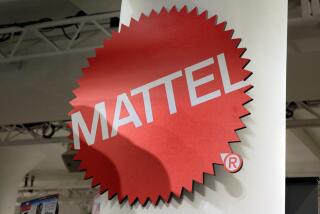Hasbro Insists U.S. Unlikely to OK Mattel Plan
Shares of Hasbro Inc. soared Thursday in the wake of Mattel’s $5.2-billion offer to merge the two companies, but Hasbro executives stepped up their opposition to a deal, providing new details on why they believe it would be blocked on antitrust grounds.
Hasbro shares rose as high as $47 but closed at $40.50 on the American Stock Exchange, up $9.875. Meanwhile, El Segundo-based Mattel Inc. lost 50 cents and dropped to $31.50 on the New York Stock Exchange.
After the close of financial markets, Hasbro’s top executives discounted the possibility of a merger, contending that a combined company would dominate the toy industry and create anti-competitive conditions.
Hasbro Chairman Alan Hassenfield and Sonny Gordon, the company’s vice chairman, said a merger involving No. 1 toy maker Mattel and No. 2 Hasbro would create a company that would be seven times larger than its closest competitor.
Hassenfield said Hasbro’s board rejected Mattel’s offer Tuesday “because the possibility of a proposal ever getting government approval . . . is extremely low.”
Gordon said a merged Mattel-Hasbro would hold leading positions in six of the major nine toy categories. Gordon said the government would not likely approve such a merger even if the companies sold off certain lines because competing companies are too small to arrange licensing deals for certain new toys.
Mattel, however, discounted the arguments of its Rhode Island-based rival and said it still hopes to hold merger discussions.
“Hasbro management didn’t introduce anything we had not taken into account in our extensive analysis of antitrust implications,” Mattel said in a statement. “We continue to be confident that any potential antitrust issues can be resolved without affecting the significant benefits that will be realized by the combined entity.”
The antitrust issue could present problems, but not unsurmountable obstacles, many industry analysts said. With Barbie and the tot-oriented Fisher-Price division in its stable, Mattel’s strengths are in the fashion-doll and infant-toy categories. With male action figures such as GI Joe and the Milton Bradley label under its roof, Hasbro is strong in toys for boys and in board games.
“The government is going to be most concerned about what affects the consumer,” said Sean McGowan, an analyst at Gerard Klauer Mattison in New York. “It’s hard to prove that prices are going up when there’s so little category overlap.”
However, McGowan said Hasbro’s Playskool division competes directly with Mattel’s Fisher-Price in toys for infants and that possible dominance in the preschool-toy category would have to be resolved before any merger.
Pressure for such a merger may build because about 70% of Hasbro’s shares are controlled by institutional investors who would want to enhance their stock value, analysts said. Mattel announced the merger proposal on Wednesday partly because it wanted to inform Hasbro shareholders of the opportunity.
More to Read
Inside the business of entertainment
The Wide Shot brings you news, analysis and insights on everything from streaming wars to production — and what it all means for the future.
You may occasionally receive promotional content from the Los Angeles Times.










